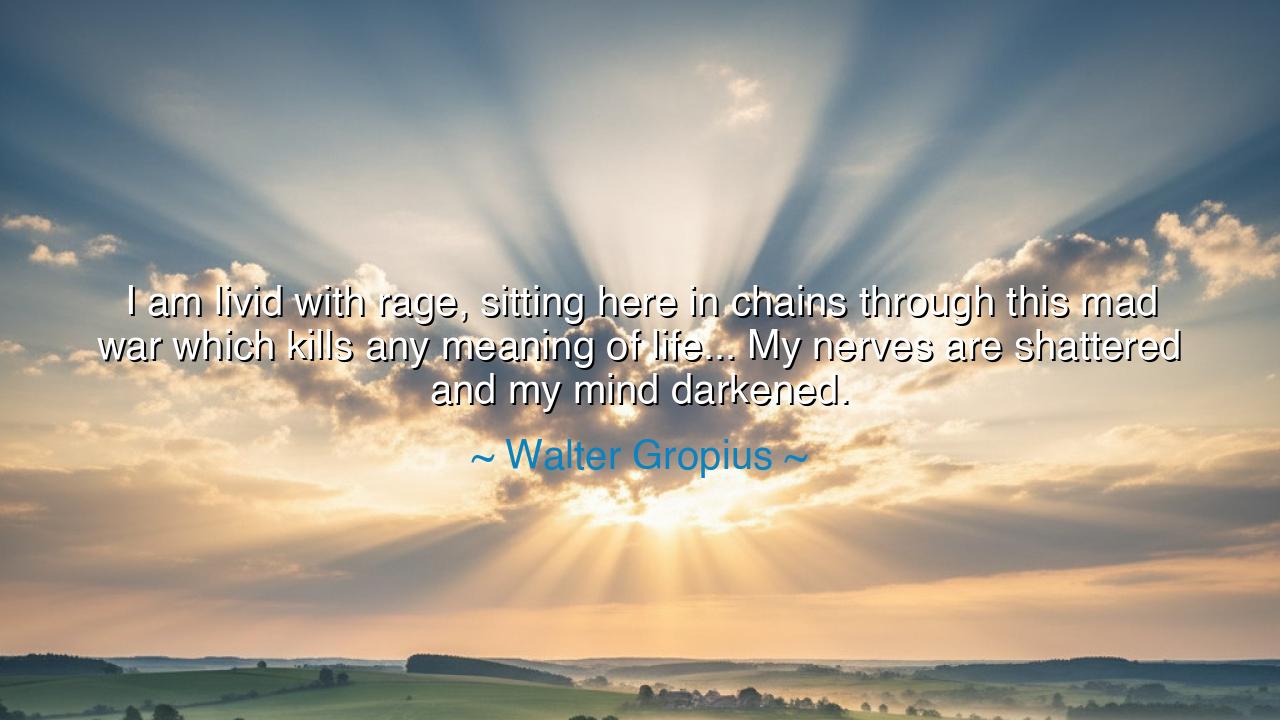
I am livid with rage, sitting here in chains through this mad
I am livid with rage, sitting here in chains through this mad war which kills any meaning of life... My nerves are shattered and my mind darkened.






Hear the lament of Walter Gropius, architect and visionary, who once cried out: “I am livid with rage, sitting here in chains through this mad war which kills any meaning of life… My nerves are shattered and my mind darkened.” These words, torn from the heart of a man who built beauty but was forced to endure destruction, bear the weight of despair. They reveal how war not only kills bodies but shatters the soul, stripping life of meaning and dragging even the noblest of minds into shadow.
The origin of these words lies in the crucible of the First World War. Gropius, who would one day found the Bauhaus movement and shape the architecture of the modern age, was then a soldier, shackled to a conflict he neither desired nor believed in. The trenches were not his canvas, yet he was bound there, watching the slaughter of youth, the waste of creation, and the undoing of all that gives life its sacredness. His words are the outcry of an artist imprisoned by forces larger than himself—chains not only of iron but of duty, nationalism, and madness.
The meaning of this cry is profound. It tells us that war annihilates not only the body but the spirit. For those who dream of beauty, who build and imagine, war is a cruel mockery. It reduces life to survival, and survival to despair. Gropius’s shattered nerves and darkened mind are not his alone—they are the inheritance of all who are forced into wars they did not choose, whose souls are crushed by the weight of destruction. His rage is the rage of countless generations who have seen their purpose stolen by conflict.
Consider the tale of the poet Wilfred Owen, who, like Gropius, found himself chained to the trenches of the First World War. Owen, too, wrote of shattered minds and broken spirits. In his poem “Dulce et Decorum Est,” he described soldiers trudging like beggars, choking in gas, and dying in filth. He called the old lie—that it is sweet and fitting to die for one’s country—a bitter fraud. Like Gropius, Owen revealed that war kills not only men but the very meaning of life, turning nobility into absurdity. Both men, through word and art, bore witness to the spiritual death that follows physical destruction.
The lesson in Gropius’s words is timeless: that humanity must resist the chains of war, for they bind not only limbs but minds. A society that sends its creators to kill cannot thrive; it consumes its future for the sake of fleeting pride. His rage calls to us across the decades: never accept war as natural, never glorify it, never forget its power to darken even the brightest souls.
What, then, must we do? We must labor not only to remember the pain of war but to guard against its return. We must honor the visions of builders, artists, and dreamers, whose gifts are extinguished when wars demand their lives. And in our daily lives, we must resist the temptation to see conflict as noble or inevitable, choosing instead to create, to reconcile, to build bridges where others would raise walls.
Therefore, let Gropius’s shattered cry be preserved as both warning and testament. If even he, a man who dreamed of light-filled structures and harmonious design, could be driven to despair, then none are immune to the madness of war. Let us vow that our generation will not place its dreamers in chains, nor permit the mad war to kill the meaning of life again. For in protecting peace, we protect not only lives, but the very soul of humanity itself.






NLmot nguoi la
The phrase ‘kills any meaning of life’ feels devastatingly final. It makes me reflect on how external chaos can strip away inner purpose. For someone like Gropius—who built his career on order, innovation, and progress—such disillusionment must have been unbearable. Did this experience lead him to seek meaning in creation afterward, through architecture? Or did it remain an open wound that shaped his entire worldview?
HHHoang Huyen
This line captures the moment when idealism meets brutal reality. I can’t help but think of how many people, then and now, feel trapped in conflicts they never chose. Gropius’s words echo the mental collapse that follows witnessing senseless destruction. What interests me is whether this torment gave him a new appreciation for peace—or whether it left him forever cynical about humanity’s ability to learn from war.
PHPham Hieu
There’s something haunting in how Gropius admits that his nerves are shattered and his mind darkened. It’s rare to hear such vulnerability from someone so renowned for rational design and structure. It raises a question: how do intellectuals and creators cope when their rational frameworks are torn apart by the irrationality of war? Is there any recovery from that psychological devastation?
GDGold D.dragon
The intensity of emotion here—rage, confinement, despair—feels both deeply personal and universally human. I wonder if what Gropius describes as the ‘mad war’ reflects not only physical captivity but also an existential one. When he says life loses meaning, does he mean that the ideals of progress and civilization collapse under the weight of violence and destruction?
HTHang Thanh
This quote makes me think about how war doesn’t just destroy cities or lives—it destroys the very core of what makes us human: our ability to find meaning and beauty in existence. I’m curious whether Gropius’s experience during the war later influenced his architecture, his push for simplicity and function. Was it a way to rebuild order in a world that once felt chaotic and senseless?